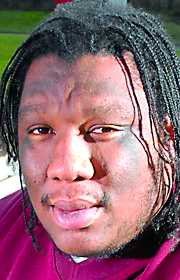Terdell Sands said he never was part of a bounty system at any time during his nine-year NFL career, but he understands the concept.
"The game of football itself is a contract to take people out. It's our job as defensive players to shut the offense down by any means," said the 6-foot-7 Sands, who weighed about 335 pounds while playing defensive tackle for six seasons with the Oakland Raiders and one year each with the Kansas City Chiefs, Green Bay Packers and New England Patriots before retiring after the 2009 season.
"If you were playing the Colts, everybody knew the best way to win the game was to take Peyton Manning out," said the former Howard High School star. "I mean, I wish you couldn't play because you had gotten food poisoning instead, but now you're on the field so I have to take you out. We don't want them hurt to the point that they never play again, but we want them out of the game because it helps my team's chances of winning."
But Sands said he did not agree with the severity of the punishment the NFL announced Wednesday for the New Orleans Saints, who had run a bounty system for several years in which defensive players were paid -- sometimes several thousand dollars -- for taking offensive players out.
"If they hadn't used that word 'bounty,' it wouldn't be any different than what goes on with a lot of other teams," Sands said. "There's a code among other players. We all know we want the other team's best player out of the game. That's just understood. And if a guy gets hurt, better him than me is how most of us looked at it."
The NFL suspended Saints head coach Sean Payton without pay for all of the coming season, banned general manager Mickey Loomis for the first eight regular-season games and assistant coach Joe Vitt for the first six games. In addition, NFL Commissioner Roger Goodell fined the Saints $500,000 and took away their second-round draft picks this year and in 2013.
Former Saints defensive coordinator Gregg Williams, who has been reported as the man responsible for the bounty system, was suspended indefinitely. Williams is now defensive coordinator for the St. Louis Rams.
Two other area defensive players, Eric Westmoreland and Eddie Moore, both of whom were all-state players at Marion County and South Pittsburg, said they never heard of a bounty system during their years in the NFL.
Westmoreland -- who along with Moore went on to become an All-SEC linebacker at the University of Tennessee and played in the NFL for about five seasons -- said the Saints' bounty system "went too far."
"This needed to come out and get addressed before somebody ended a guy's career with a malicious hit," said Westmoreland, who played four seasons with the Jacksonville Jaguars and one with the Cleveland Browns. "I commend the commissioner for having a firm hand. I didn't always agree with some of the rulings on hits, but it is such a violent sport, we need to clean that up before it trickles down to the college game or high school level."
Westmoreland and Moore both said their former NFL teams pooled money into a pot, with defensive players putting in small amounts for things such as missed tackles or dropped interceptions and other players being rewarded money from the pot for recovering a fumble or getting the first interception of a game -- or for big hits.
"It wasn't a bounty system, it was just something we did for fun," Westmoreland said. "It didn't involve coaches and was never a bounty system to hurt anybody. You might lose or gain $50 a week, so it wasn't a big deal. It was never enough to entice anybody to do anything sketchy that would hurt another player."
Moore said a bounty system is unnecessary because NFL players are already being paid to "play the game and hit hard."
"That was always my incentive as a professional," said Moore, who played three seasons with the Miami Dolphins and another with the Denver Broncos. "I think every defensive team out there was trying to knock guys out of the game, but the difference was the Saints were paying them extra and making guys think about even late hits or dirty hits to take somebody out.
"The idea is to punish the other player, but I never knew of anybody paying to hurt another player," Moore said. "You do want to put the other guy out of the game, but in a legal way, because it helps your team's chances of winning. You're not looking to hurt them long term, but the game we play isn't two-hand touch. I prided myself, like an offensive lineman with pancake blocks, on knocking guys out of a game."
Sands said Goodell "was trying to prove a point" with the punishments.
"He's a parole officer, handing out discipline. People are more scared to hit now than ever because of all the fines you get as a defensive player," he said.
Sands admitted he deliberately took out an opposing player in high school to help the Howard Hustlin' Tigers' chances of winning. During his senior season, Howard took on a Cleveland team that was led by Mr. Football running back Stepfon Woods.
"The first play was a run and I rolled Woods' ankle and hurt him," Sands said. "With Woods in the game, we didn't have a chance of beating them, so I did what I had to do at that time to help my team get an advantage. It was winning by any means necessary, and it's something that has bothered me ever since."
